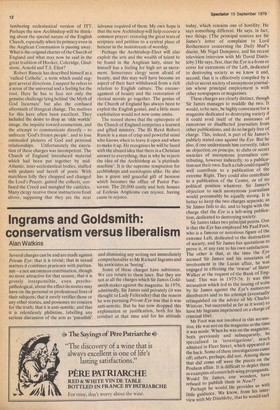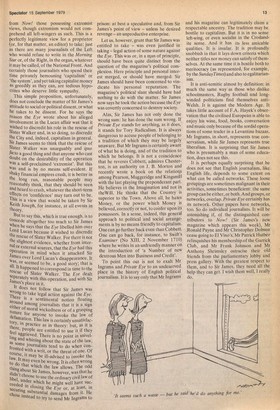Ingrams and Goldsmith: conservatism versus liberalism
Alan Watkins
Several charges can be and are made against Private Eye: that it is trivial; that in sexual matters it combines prurience with puritanism —a not uncommon combination, though no more attractive for that reason; that it is grossly irresponsible, even psychopathological, about the effect its stories may have on the personal or professional lives of their subjects; that it rarely verifies those or any other stories, and possesses no concern for the truth; that it is anti-semitic; and that it is relentlessly philistine, labelling any serious discussion of the arts as `pseudish' and dismissing any writing not immediately comprehensible to Mr Richard Ingrams and his assOciates as 'boring'.
Some of these charges have substance. We can return to them later. But they are not at all the charges which Sir James Goldsmith makes against the magazine. In 1976, admittedly, Sir James said privately (it was thought to Lady Falkender) that the reason he was pursuing Private Eye was that it was anti-semitic. But he has now dropped this explanation or justification, both for his conduct at that time and for his attitude today, which remains one of hostility. He says something different. He says, in fact, two things. (The principal sources are Sir James's letter of complaint to Lord Rothermere concerning the Daily Mail's diarist, Mr Nigel Dempster, and his recent television interview with Mr David Dimbleby.) He says, first, that the Eye is a front or cover for extremists of the Left, dedicated to destroying society as we know it and, second, that it is effectively compiled by a club or secret society of anonymous journalists whose principal employment is with other newspapers or magazines.
These charges are clearly distinct, though Sir James manages to muddle the two. It would, to be sure, be highly convenient for a magazine dedicated to destroying society if it could avail itself of the assistance of rancorous or disaffected journalists from other publications, and do so largely free of charge. This, indeed, is part of Sir James's publicly stated case against the Eye. But he also, if one understands him correctly, takes an objection, en principe, to clubs or secret societies of anonymous journalists contributing, however indirectly, to a publication not their own. Such a club could equally well contribute to a publication of the extreme Right. They could also contribute to a publication of the Centre, or of no political position whatever. Sir James's objection to such anonymous journalism would presumably be equally strong. It is better to keep the two charges separate, as Sir James fails to do, and to begin with the charge that the Eye is a left-wing publication, dedicated to destroying society. Sir James takes two principal points. One is that the Eye has employed Mr Paul Foot, who is a famous or notorious figure of the extreme Left, dedicated to the destruction of society, and Sir James has quotations to prove it, at any rate to his own satisfaction. The other is that, at the time the Eye accused Sir James and his associates of involvement in the Lucan affair, he was engaged in effecting the 'rescue' of Slater Walker at the request of the Bank of England. This was in 1975-76. It was this accusation which led to the issuing of writs by Sir James against the Eye's numerous distributors and to his attempt (eventually relinquished on the advice of Mr Charles Wintour, but successful as far as it went) to have Mr Ingrams imprisoned on a charge of criminal libel. Mr Foot was not involved in this accusation. He was not on the magazine at the time it was made. When he was on the magazine, both previously and subsequently, he specialised in 'investigations', much admired in Fleet Street, which appeared at the back. Some of these investigations came off; others, perhaps, did not. Among those that did come off were the pieces on the Poulson affair. It is difficult to depict these as examples of covert left-wing propaganda. Would Sir James, one wonders, have refused to publish them in Now!? littPleerghuaipdsanhcee.wwoueldk. Hnoewprforvoides mhwit view with Mr Dimbleby, that he would sac from Now! those possessing extremist views, though extremism would not comprehend all left-wingers as such. This is a perfectly legitimate view for a proprietor (or, for that matter, an editor) to take: just as there are many journalists of the Left who would refuse to write in the Morning Star or, of the Right, in the organ, whatever it may be called, of the National Front. And certainly those journalists who spend their time privately bemoaning 'capitalism' or 'the system', and yet taking capitalist money as greedily as they can, are tedious hypocrites who deserve little sympathy.
This simple proposition, unfortunately, does not conclude the matter of Sir James's attitude to social or political dissent, or what he takes to be dissent. For he says the reason the Eye wrote about his alleged Involvement in the Lucan affair was that it wished to discredit his role in the rescue of Slater Walker and, in so doing, to discredit the City and, indeed, capitalism in general. Sir James seems to think that the rescue of Slater Walker was unarguably and ipso facto a good thing and that anyone who cast doubt on the desirability of the operation was a self-proclaimed 'extremist'. But this was and is by no means self-evident. If Shaky financial empires crash, it is better in the long run, reasonable people may reasonably think, that they should be seen and heard to crash, whatever the short-term effects on 'confidence' may turn out to be. This is a view that would be taken by Sir Keith Joseph, for instance, at all events in theory. Butte say this, which is true enough, is to concede altogether too much to Sir James When he says that the Eye libelled him over Lord Lucan because it wished to discredit the rescue of Slater Walker. For there is not the slightest evidence, whether from internal or external sources, that the Eye had this Operation in mind when it attacked Sir James over Lord Lucan's disappearance. It was, or seemed to be, a good story; that is all. It happened to correspond in time to the rescue of Slater Walker, The Eye dealt separately with this operation, and with Sir James's place in it. It does not follow that Sir James was _wrong to take legal action against the Eye. There is a sentimental notion floating around among journalists that it is a sign either of moral wickedness or of a grasping nature for anyone to invoke the law of defamation efamation. This law is certainly unsatisfactory, Ty, in practice as in theory: but, as it is there, People are entitled to use it if they feel aggrieved. There is no point in snivel ing and whining about the state of the law, as some journalists tend to do when confronted with a writ, or the threat of one. Of _course, it may be ill-advised to invoke the law. It may even be wrong. It is often wrong to do that which the law allows. The odd thing about Sir James, however, was that he libel, choose to use the ordinary civil law of b I el, under which he might well have succeeded in closing the Eye or, at least, in securing substantial damages from it. He chose instead to try to send Mr Ingrams to prison: at best a speculative and, from Sir James's point of view – unless he desired revenge – an unproductive enterprise.
Let us, however, grant that Sir James was entitled to take – was even justified in taking – legal action of some nature against the Eye. This was or, in a man of principle, should have been quite distinct from the question of the magazine's political complexion. Here principle and personal interest merged, or should have merged: Sir James should have been concerned to vindicate his personal reputation. The magazine's political slant should have had nothing to do with the matter. Sir James now says he took the action because the Eye was covertly concerned to destroy society.
Alas, Sir James has not only done the wrong sum: he has done the sum wrong. If Private Eye stands for anything., as it does, it stands for Tory Radicalism. It is always dangerous to accuse people of belonging to a tradition of which they may be largely unaware. But Mr Ingrains is certainly aware of what he is doing, and of the tradition to which he belongs. It is not a coincidence that he reveres Cobbett, admires Chesterton, is an authority on J. B. Morton and recently wrote a book on the relations among Pearson, Muggeridge and Kingsmill with the last playing the preponderant part. He believes in the Imagination and not in theWill. He thinks that the Country is superior to the Town. Above all, he hates Money, or the power which Money is believed, correctly or not, to confer upon its possessors. In a sense, indeed, this general approach to political and social arrangements is by no means friendly to capitalism. One can go further back even than Cobbett. One can go back, for instance, to Swift's Examiner (No XIII, 2 November 1710) where he writes in an unfriendly manner on the introduction of 'a Number of new dextrous Men into Business and Credit'.
To point this out is not to exalt Mr Ingrains and Private Eye to an undeserved place in the history of English political journalism. It is to say only that Mr Ingrams and his magazine can legitimately claim a respectable ancestry. The tradition may be hostile to capitalism. But it is in no sense left-wing, or even socialist in the Crosland ite sense. And it has its less amicable qualities. It is insular. It is profoundly snobbish in that it lays down criteria which neither titles nor money can satisfy of themselves. At the same time it is hostile both to meritocracy (as represented, for example, by the SundayTirnes)and also to egalitarianism.
It is anti-semitic almost by definition: in much the same way as those who dislike schoolmasters, Rugby football and longwinded politicians find themselves antiWelsh. It is against the Modern Age. It takes little account of F.A. Hayek's observation that the civilised European is able to enjoy his wine, food, books, conversation and music only because of the sordid operations of some trader in a Levantine bazaar. Mr Ingrams, in short, represents true conservatism, while Sir James represents true liberalism. It is surprising that Sir James who is presumably a man of some education, does not see this.
It is perhaps equally surprising that he does not see that English journalism, like English life, depends to some extent on what can be called networks. These loose groupings are sometimes malignant in their activities, sometimes beneficient: the same group can be either, or both. And groups, or networks, overlap. Private Eye certainly has its network. Other papers have networks, too. So do individual journalists. It will be astonishing if, of the distinguished contributors to Now! (Sir James's new magazine which appears this week), Mr Ronald Payne and Mr Christopher Dobson cease going to El Vino's, Mr Patrick Hutber relinquishes his membership of the Garrick Club, and Mr Frank Johnson and Mr Anthony Shrimsley ostracise their old friends from the parliamentary lobby and press gallery. With the greatest respect to them, and to Sir James, they need all the help they can get. I wish them well, I really do,



































 Previous page
Previous page